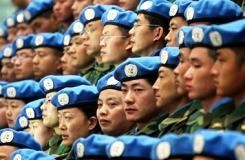China’s peacekeeping force in Sudan signals new global position
By Gordon Fairclough
September 17, 2007 (QINYANG, China) — China’s plan to send 315 soldiers to Sudan’s war-torn Darfur region next month as part of an international peacekeeping force signals a broader shift in Chinese foreign policy that is reshaping the country’s role in global politics.
 The soldiers, an engineering unit from China’s People’s Liberation Army, will be sent as the leading edge of a combined United Nations and African Union force.
The soldiers, an engineering unit from China’s People’s Liberation Army, will be sent as the leading edge of a combined United Nations and African Union force.
During drills here this weekend that underlined Beijing’s desire to be seen as a force for peace in Darfur, camouflage-clad soldiers with blue U.N. emblems on their sleeves fanned out alongside armored personnel carriers and practiced pitching tents for refugees and laying down a portable bridge for an audience of foreign reporters.
Beijing is seeking to blunt mounting disapproval of its policy of engagement with Sudan in the run-up to next year’s Olympics. China has been criticized for supporting the Sudanese Khartoum-based government, which is battling rebels in Darfur, with oil purchases and weapons sales.
China’s long-touted policy of not interfering in the internal affairs of other states is giving way to a broader definition of national interests and a greater willingness to embrace global institutions and international norms — and to use them to advance its foreign-policy goals.
This year, China is set to become the world’s third-largest economy, surpassing Germany. With its rise, China is in many ways trying to position itself as an alternative world power, a country that has managed to have economic progress without Western-style democracy.
“China wants to play a big-power role,” says Jing Huang, a specialist in Chinese foreign policy at the Brookings Institution, a think tank in Washington. “China is providing a different model of development. That’s their strategy.”
Beijing’s newly activist and pragmatic stance has given it a crucial role in the dispute over North Korea’s atomic ambitions. China is even flexing its diplomatic muscles in the Middle East, opposing coercive action against Iran, which is one of its most important oil suppliers, over Tehran’s nuclear programs.
In the case of Darfur, China, which buys about two-thirds of Sudan’s crude output, has been reluctant to use the full weight of its economic leverage to force the Khartoum government to make peace in Darfur. Beijing has insisted sanctions would be counterproductive. Instead, Chinese officials say, they have used behind-the-scenes diplomacy to persuade the Sudanese government to accept the U.N. peacekeeping mission. Last week, China’s special envoy on Darfur, Liu Guijin, offered to be a go-between in talks between the Khartoum government and rebel groups.
A four-year-old conflict between rebels and government-backed militias has left 200,000 dead and 2.5 million homeless in Darfur. China’s continued friendly relations with Khartoum have drawn protests from governments and human-rights organizations.
China’s leaders don’t want anything to spoil the Olympics, which are seen here as a celebration of the country’s growing economic clout and its more important place on the world stage.
“China has an obligation to make its contribution to the maintenance of world peace,” said Senior Col. Dai Shaoan, a peacekeeping official in China’s Defense Ministry. He said China’s government will “actively support” efforts to “quickly restore peace and start reconstruction work” in Darfur.
He also said China doesn’t plan to abandon its policy of engagement with Khartoum, “whether people continue to blame China or not,” adding that it is unfair to hold China responsible for the Darfur violence simply because it is on “friendly” terms with the Sudan government.
China, which joined the U.N. in 1971 after being given the seat held by the government in Taiwan, opposed peacekeeping missions for nearly two decades, saying they represented meddling in other countries’ affairs. In recent years, there has been a major change. The country joined the U.N.’s standby system to rapidly supply soldiers for missions under the U.N. flag. Last month, a Chinese general was appointed to command a U.N. peacekeeping mission for the first time, overseeing troops monitoring a cease-fire in the disputed territory of the Western Sahara.
China’s growing participation is filling what Chinese diplomats say is a void left by declining contributions from Western armies preoccupied with wars in Iraq and Afghanistan. China has more than 1,500 soldiers serving in U.N. missions in Congo, Liberia, Lebanon and Sudan.
“The PLA’s role is not only to protect our own country, but to help keep peace around the world,” said First Sgt. Fan Xigong, 24 years old, who volunteered for the Darfur mission.
(Wall Street Journal)
